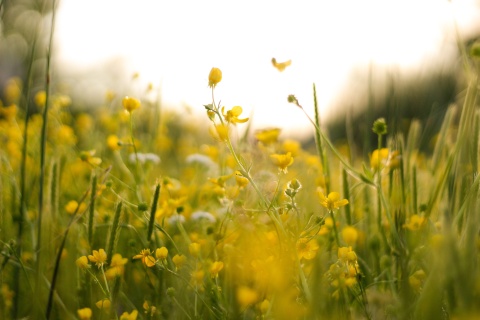
Image: Brianna Amick, Picturesque field with small yellow wildflower, Pexels, Pexels License
In order to limit global warming to 1.5°C, we not only need to bring greenhouse gas (GHG) emissions down as close to zero as possible, but also actively take carbon dioxide (CO2) out of the atmosphere. The carbon sequestration potential of land has drawn increasing attention as the need to achieve negative emissions becomes ever more urgent.
When it comes to agriculture, the role of ruminant livestock (e.g., cattle, sheep, and goats) in sequestering CO2 through grazing on the one hand, and in contributing to GHG emissions and other environmental damage on the other have become highly polarized topics of debate. Some argue that well-managed grazing systems can help draw down CO2 from the atmosphere and lock it in soils, while yielding a range of other benefits for water and biodiversity. Others, however, highlight the association between ruminant livestock expansion, deforestation, and soil degradation, with accompanying declines in soil quality, water retention and biodiversity.
So what does the science actually say? How do the specificities of local context fit into our understanding of global land use interactions and into wider debates about what a good food system looks like?
To explore these questions, TABLE held a panel discussion on 14 September at 6pm BST with leading thinkers and researchers on agriculture, food systems and climate change mitigation.
Watch the recorded event here
Speakers:
M. Francesca Cotrufo is a Professor in the Department of Soil and Crop Sciences at Colorado State University. Dr Cotrufo is a soil ecologist and biogeochemist, internationally recognized for her work in the field of litter decomposition and soil organic matter dynamics, and in the use of isotopic methodologies in these studies. With Dr Keith Paustian and other colleagues at CSU, she recently formed the Soil Carbon Solution Center. Dr Cotrufo is editor of the journal Global Change Biology. She has been the recipient of the SSSA Soil Science Research Award, the CSU Provost 14’er Award for Faculty Excellence, and the ASA- CSSA-SSSA Mentoring Award. Recently, Dr Cotrufo became an entrepreneur and co-funded, with other five women in her lab, Cquester Analytics, an analytical facility designed to accurately quantify, using science- based approaches, metrics of soil organic matter and C sequestration at scale.
Pete Smith is Professor of Soils and Global Change at the Institute of Biological and Environmental Sciences at the University of Aberdeen and Science Director of the Scottish Climate Change Centre of Expertise (ClimateXChange). His interests include climate change mitigation, soils, agriculture, food systems, ecosystem services and modelling. He has been an author on many reports of the Intergovernmental Panel on Climate Change (IPCC) and led its work of climate change mitigation in agriculture, forestry and land for its 4th and 5th Assessment Reports, and led its work interlinkages between land based mitigation options for the IPCC Special Report on Climate Change and Land. He is a Fellow of the Royal Society of Biology, a Fellow of the Institute of Soil Scientists, a Fellow of the Royal Society of Edinburgh, a Foreign Fellow of the Indian National Science Academy, a Fellow of the European Science Academy, and a Fellow of the Royal Society (London).
Matthew Hayek is an Assistant Professor in the Department of Environmental Studies at New York University (NYU). He received his PhD from the Harvard John A. Paulson School of Engineering and Applied Science. Hayek's research quantifies the environmental impacts of our food system, with a specific focus on climate change. Prior to joining NYU, Hayek was a postdoctoral researcher at Harvard Law School.
This event is moderated by Tara Garnett who is Director of TABLE and a researcher at the University of Oxford.
Watch the recorded event here






